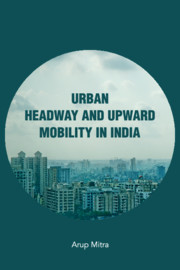Book contents
- Frontmatter
- Contents
- List of Tables
- Acknowledgements
- 1 Analytical Frame
- 2 Assessing the Quality of Cities and Towns
- 3 New Patterns and New Strategies in Indian Urbanization
- 4 Growth, Informal Sector Employment and Poverty
- 5 Upward Mobility of the Disadvantaged Sections
- 6 Erosion of the Caste Factor?
- 7 Changes in a Cultural Variable
- Bibliography
- Index
2 - Assessing the Quality of Cities and Towns
Published online by Cambridge University Press: 30 April 2020
- Frontmatter
- Contents
- List of Tables
- Acknowledgements
- 1 Analytical Frame
- 2 Assessing the Quality of Cities and Towns
- 3 New Patterns and New Strategies in Indian Urbanization
- 4 Growth, Informal Sector Employment and Poverty
- 5 Upward Mobility of the Disadvantaged Sections
- 6 Erosion of the Caste Factor?
- 7 Changes in a Cultural Variable
- Bibliography
- Index
Summary
Introduction
The agglomeration framework suggesting higher productivity gains in larger cities can be extended to argue that part of the productivity gains benefits workers in terms of higher wages (Duranton, 2016) compared to those in small towns. Higher economic growth originating from large cities is likely to have some percolation effect even when it is accompanied by a sizeable increase in inequality. Increased earnings may result in better living standards in terms of food as well as non-food consumption and also through enhanced investment in dwelling conditions and basic amenities. Thus size, productivity, and amenities all three can be in relationship. Also, in the size–productivity literature, infrastructure is seen to be a major driver of agglomeration economies. One may then argue further that infrastructure enhances the quality of living in large cities. Initially, government investment encourages concentration of activities which in turn motivates private investment and expands the city size further, unfolding simultaneity between investment and city size. Enhanced investments coming from the government, private sector, and households result in improved living standards including accessibility to various amenities. This would mean that deprivation defined in terms of the lack of access to assets, amenities, and quality housing would be in relationship with city size.
On the whole, the agglomeration economies in large cities are seen to benefit not only the business firms but also consumers. In large cities there are usually a number of labour recruitment centres (informal), and as new contacts develop, individuals tend to access more than one labour recruitment centre simultaneously, which in turn breaks the labour market segmentation and raises the number of options, leading to occupational diversification and upward income mobility (Mitra, 2010a, 2010b). Skilled workers are more likely to prefer megacities than the unskilled ones (Glaeser, Ponzetto, and Zou, 2016). Better connectivity, cheap transport system, and availability of alternative modes of transport help individuals commute faster, which does not restrict them to secure jobs in the neighbourhood of the place of residence. Further, labour exploitation in large cities is less as unions and various voluntary organizations in some form or the other safeguard the interest of the general public.
- Type
- Chapter
- Information
- Urban Headway and Upward Mobility in India , pp. 15 - 41Publisher: Cambridge University PressPrint publication year: 2020



